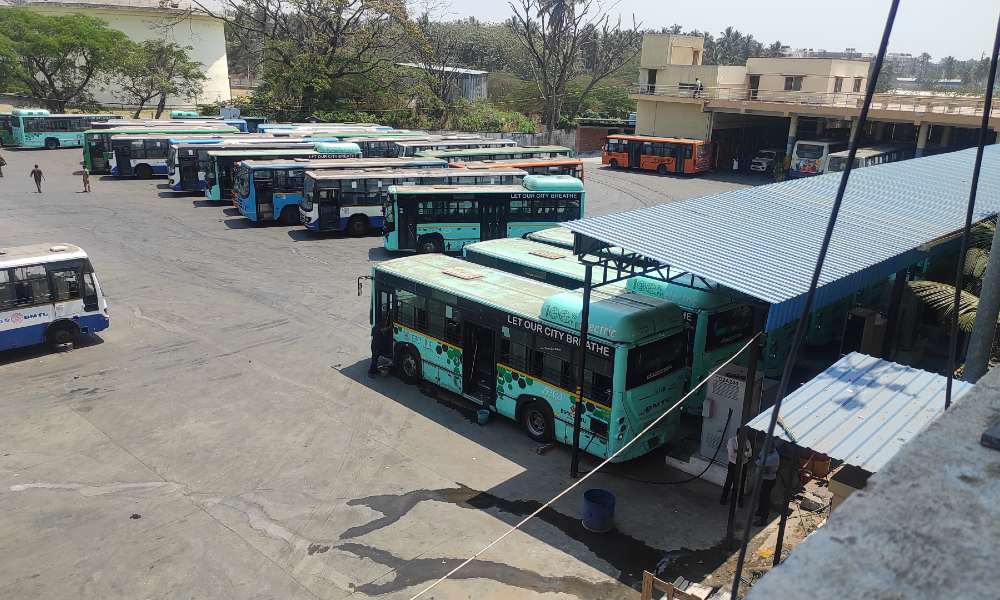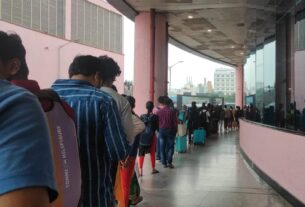BMTC officials say that more electric and diesel buses will be inducted soon to reduce overcrowding.
Bengaluru Metropolitan Transport Corporation (BMTC) is planning to introduce more diesel and electric buses. The officials from BMTC say that the tender has been floated.
Sunitha Jain, Public Relations Officer (PRO) at BMTC said that they have issued tenders for the introduction of 800 new diesel buses. She said, “Not only diesel buses, we are planning to add more electric buses in April.” However, the date for inducting these electric buses is not yet decided.
She said, “Around 6,200 diesel buses and 500 electric buses run in the city.” She added that this introduction of new buses is to avoid increasing air pollution because of vehicular emission and overcrowding.
According to the BMTC press release, around 38 crore women in Karnataka have travelled in BMTC service under the ‘Shakti’ scheme introduced in 2023. This shows the increase in the number people travelling in the BMTC buses. Daily commuters complain about overcrowding in the buses.
The press release also states that to curb the increasing vehicular emission in the city, BMTC has taken several measures and, introducing electric buses is one among them.
Hema, a third-year college student said that she travels in the BMTC buses daily. She said that in the morning whenever she is travelling in BMTC buses, it is always overcrowded. She said that the government can also take some measures by introducing more buses so that it will help reduce overcrowding.
She also said that she always wears a mask as the air quality in the city is sometimes unhealthy. She said, “As the air quality in the city gets worse sometimes, introducing more e-buses will at least help to improve the air quality.
Radhika, who travels in the BMTC buses occasionally said that electric buses are comfortable compared to the BMTC diesel buses. She said, “These electric buses are very comfortable while travelling as they don’t produce any noise like the diesel buses.” She said that these electric buses would help in reducing the air pollution in the city and reduce health problems like asthma.

A study on vehicular pollution in Bangalore, conducted by the P.E.S College of Engineering found that 60 percent of air pollution in the city is because of vehicular emission.
In the revised action plan released by the Karnataka State Pollution Control Board (KSPCB), the induction of electric buses in a phased manner was planned. It also states that BMTC will continue to emission check the buses on a monthly basis to monitor the vehicular emission in the BMTC buses.
This report also states that the diesel buses which have covered 8.5 lakhs kms or 11 years will be scrapped and the new diesel buses will be inducted. As per this practice BS-III (Bharat Stage III) will be scrapped in phased manner and BS-IV (Bharat Stage IV) buses will be introduced. These BS-IV buses will manage and control evaporative vehicular emission compared to the BS-III buses.
A report by C40 Cities Climate Leadership Group which addresses climate change, found that transport is the reason for 44 percent of greenhouse gas emissions in Bangalore. It also states that transport is the biggest source of air pollution in Bangalore. The report mentions that the buses in Bangalore are responsible for 25 percent of PM2.5 emissions and if no action is taken, it is expected to double by 2030.

In 2023, the government of India announced the PM-e bus Sewa Scheme. This scheme will expand urban bus operations by introducing 10,000 electric buses in 169 cities.
According to the news reports published in December 2023, 11 cities from Karnataka were qualified under the PM-e bus Sewa Scheme.
Shri Prakash, Professor of Sustainable Mobility at TERI School of Advanced Studies, said that these e-buses will help in reducing emission. He said, “When a lot of e-buses are introduced for public transport, then there will be a huge reduction in air pollution as 40 percent of the increase in the air pollution is because of vehicular emissions.” He said that using e-vehicles will certainly help in improving the air quality.
He said that the usage of e-vehicles will also reduce noise pollution in the cities. “Introducing schemes for improving urban transport is a good initiative taken by the government,” he said. He added that by introducing e-buses in the cities, the Indian government focuses on reducing air pollution by inducting more electric buses as this will reduce the vehicular emission. “Planning and proper usage of e-buses by the government will make the city much better,” he said.
Akshay Heblikar, Director at Eco – Watch said, “Though these e-vehicles are less polluting in terms of carbon emission, getting the resources that are used in making these batteries can pollute the environment.” He said that lithium is the majorly used mineral in making electric batteries. He added that a lot of new mining has started to get lithium for making these electric vehicles which will affect the environment.
Akshay said, “E-vehicles will not pollute the environment while they run but the process of getting the resources for making the batteries will increase the pollution in the city.” He said that the disposal of the used batteries is also a big concern. He said, “Before introducing these e-buses or e-vehicles, we have to think about all the issues around it.”




